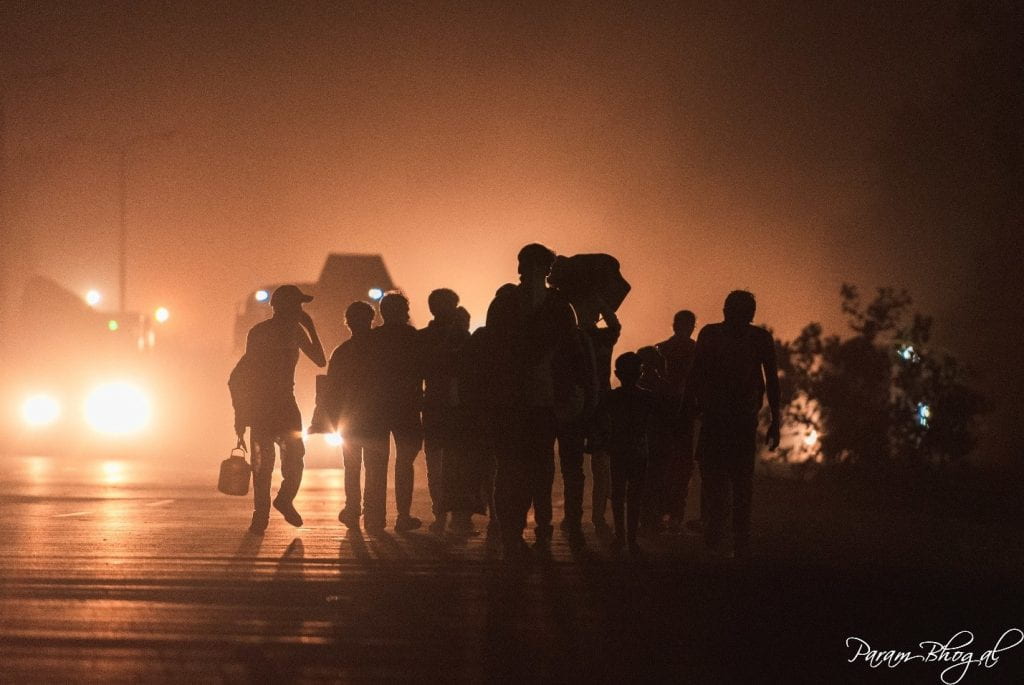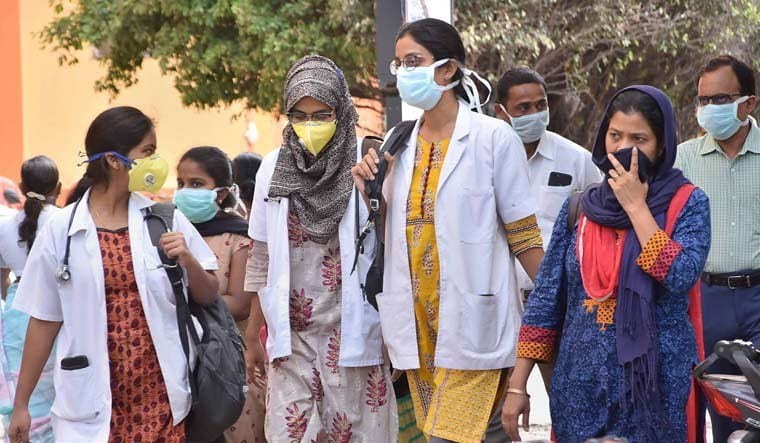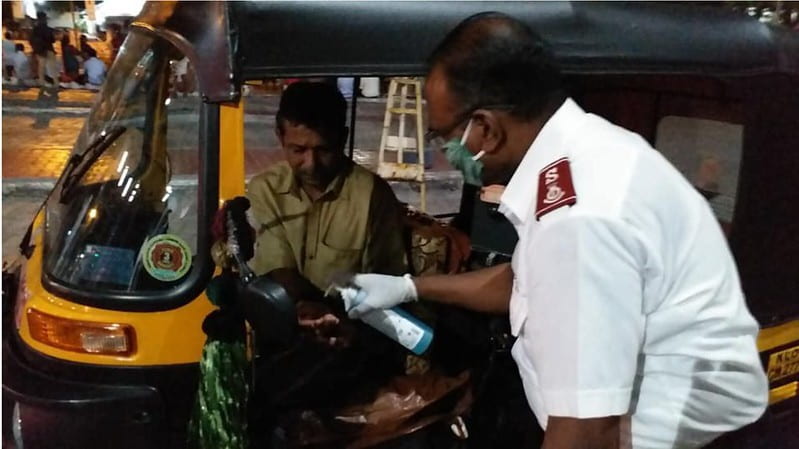While the novel coronavirus (COVID-19) has impacted almost every corner of the globe, parts of Asia are still just beginning to see the systemic effects of the pandemic. As the second most populous country in the world, India has experienced a rise in COVID-19 cases and deaths which magnify current injustices across the country. This blog addresses India’s importance within the COVID-19 pandemic and its relationship with human rights issues concerning feeble governance, police brutality, migrant displacement, and Islamophobia.
As of late-July, over 1.4 million Indians have been diagnosed with COVID-19, while over 32,000 have died from the virus. India’s western state of Maharashtra is currently the country’s epicenter with over 375,000 confirmed cases of COVID-19. On the southern coastline, the state of Tamil Nadu has the country’s second-largest number of confirmed cases (210,000+), while the capital territory of Delhi in the northwest has recently exceeded 130,000 confirmed cases. Additionally, the southeastern state of Andhra Pradesh has confirmed over 95,000 cases of COVID-19. Interestingly, India’s most populous state, Uttar Pradesh, has only confirmed just over 65,000 cases which triggers questions about access to COVID-19 testing and essential resources throughout the country.
A National Lockdown
In late-March, the Indian government issued a nationwide lockdown that lasted two months. Inconveniently, the country’s 1.3 billion inhabitants were given less than a 4-hour notice of this initial 3-week lockdown. The effects of this tall order were apparent on day one since so many people throughout the country live on a daily wage or in extreme poverty. As food supply chains became compromised and manufacturing facilities closed, the country’s unemployment rate reached a 30-year low. All the while, facilities such as schools and train coaches have been converted into quarantine centers. These attempts have seemingly delayed the inevitable spike of COVID-19 cases. However, it is speculated that the low number of confirmed cases is the result of low testing rates.
This outcome has been attributed to lax contact tracing, stringent bureaucracy, and inadequate health service coordination, namely in Delhi where cases have recently surged. However, as India reopens, the number of confirmed COVID-19 cases has increased. Additionally, the introduction of newly-approved antigen kits have allowed for rapid diagnostic testing, although testing is not to be distributed proportionately. More specifically, family members and neighbors of people who have tested positive for COVID-19 claim they are not being tested. Also, in several instances, the family members of people who have tested positive for COVID-19 were not being informed about their loved one’s diagnosis. After much scrutiny, however, local health authorities in Delhi have attempted to pick up the pieces by using surveillance measures such as door-to-door screenings, drones, and police enforcement.
Policing the Police
While the recent murder of George Floyd sent shockwaves across the world, India has been confronting its own relationship with police violence. In June, two Tamil Nadu shopkeepers, J Jayaraj and his son Bennicks Immanuel, were arrested for keeping their business open past permitted hours during the national lockdown. They were then tortured while in police custody and died days later in the hospital. Due to this event garnering considerable attention and protesting, six police officers have since been arrested for their deaths. Also, Tamil Nadu police officers with questionable track records will now undergo behavioral correction workshops. However, this incident is no anomaly. According to the National Human Rights Commission (NHRC), nine Indians die in judicial or police custody every day. In comparison, official government crime data claims 70 people were killed in Indian police custody in 2018. This striking differential in reported custodial deaths suggests India’s law enforcement entities lack accountability and are riddled with corruption.
Much like the United States, India has a history tainted with police violence that disproportionately affects minority groups, namely people from the lowest Dalit caste, indigenous groups, and Muslims. With no choice but to work during the national lockdown, many of India’s poorest citizens were beaten by police. Videos of these violent acts surfaced across social media. In opposition, there have been over 300 reported incidents of attacks on police officers alone in Maharashtra. These recent events highlight the need for the Indian government to pass anti-torture legislation that curbs police violence. By ratifying the United Nations Convention Against Torture, the Indian government can help remove the colonial vestiges of power and punishment that have plagued the country for generations.
Migrant Displacement
The sudden announcement of a national lockdown had tremendous repercussions for the tens of thousands of daily-wage migrants throughout India. Overnight, businesses closed and transportation systems suspended throughout the country, placing many migrant workers in precarious economic conditions. Men, women, and children hunkered down in urban centers across the country as they waited for their workplaces to reopen but to no avail. In response, India’s major cities experienced an exodus of migrant workers attempting to return to their home states on foot, many living hundreds, even thousands, of miles away. As thousands trekked home, many died due to dehydration, exhaustion, sunstroke, and traffic accidents. Reports of pregnant women delivering, and subsequently carrying, their children in these horrific conditions have also surfaced.
A recent Supreme Court order has urged the well-being of India’s 100 million internal migrant workers affected by the hardships of COVID-19 by requiring the government to register, feed, shelter, and transport them until they return home. However, these efforts are seemingly inadequate because most internal migrant workers have not qualified for these “relief packages”, while those who have qualified are experiencing limited coordination between state governments. All the while, India has ended its national lockdown and many migrant workers are trying to return to their places of employment. Some employers are sponsoring the return of their lost workers, while some must find their own means to return. As such, some states have sought local help to accommodate the loss of migrant workers which places many Indians in even greater economic uncertainty.

Pathologizing Islam
COVID-19 in India has contributed to a surge in anti-Muslim rhetoric that suggests this religious minority group is purposely spreading the virus. The rumors began after Tablighi Jammat, a Muslim missionary group, held a congregation outside of India and, soon after, many members tested positive for COVID-19 in New Delhi. Videos on WhatsApp and various television channels have proliferated this misinformation to the Indian public alongside the usage of phrases such as “corona jihad” and “corona terrorism”. To make matters worse, the Bharatiya Janata Party (BJP)-led government, which is notorious for its Hindu nationalist sentiments, has begun incorporating Tablighi Jamaat-related statistics to its daily COVID-19 briefings. Such rhetoric has influenced a slew of Islamophobic acts such as prohibiting neighborhood entry, restricting sales by street vendors, and even violent attacks.
These recent events fuel an existing fire that posits Muslims as reproducing at a pace to outnumber Hindus and compromising “Mother India”. However, recent efforts between Muslim Indians and allies has been quick to respond to this COVID-19 misinformation because they have been protesting India’s new citizenship law that offers amnesty to various non-Muslim immigrants and a nationwide citizen count that necessitates proof of documentation dating several years back. The BJP has made it apparent that Muslims are not welcome in India and weaponized the COVID-19 pandemic as a part of its Islamophobic campaign. As such, these efforts corner Muslim Indians into political and economic insecurities that pressure apartheid at a time when unity is paramount.

Human Rights in India
As displayed, India has an array of prevalent human rights issues that have compounded since the arrival of COVID-19. Among the efforts that could protect Indians from these concerns are labor protections, health care reform, civil rights for minority groups, food security, and income equality. However, Prime Minister Narendra Modi has propagated a narrative of self-reliance that undermines these systemic inequalities. Service provision has highlighted these discrepancies because resources are scarce, and those with power and privilege are placed to the front of the line. In addition, many Indians cannot abide to the recommended sanitation and social distancing measures due to living in poor, dense settlements in the heap summer when water sources are limited.
Although tearing through communities and disrupting daily life in India, the COVID-19 pandemic can be viewed as an opportunity for social change. More specifically, it is well within the power of Parliament, the media, civil society, and local governments to right these wrongs by ending communal bias and impartiality within state institutions. Addressing these corrupt and oppressive practices will not only remediate the effects of COVID-19 but help shape an equitable future for a country that is rapidly becoming a global super power and expected to be the most populous country in the world by 2027. Real change and equity in the world’s largest democracy could send a much-needed shockwave of justice across the globe.



